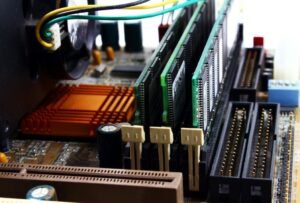AI for Game Production
Artificial Intelligence (AI) has revolutionized various industries, and the gaming industry is no exception. AI technologies have become an integral part of game production, enhancing game design, development, and overall player experience. This article explores the role of AI in game production and its impact on the gaming industry.
Key Takeaways:
- AI in game production improves game design, development, and player experience.
- AI can simulate human-like behaviors, creating more realistic in-game characters.
- Machine learning algorithms enable procedural generation, saving time and effort in level design.
- AI-powered analytics help game developers make data-driven decisions.
- Emerging AI technologies, like deep learning, are pushing the boundaries of game production.
AI technologies have transformed game production by providing tools and techniques that enhance the overall gaming experience. One of the remarkable capabilities of AI is its ability to simulate human-like behaviors. Using **natural language processing** and **computer vision**, AI algorithms can analyze and understand player actions, enabling the development of more dynamic and responsive in-game characters. These characters can react to player emotions, adapt to changing situations, and evolve their strategies over time, making the game environment feel more realistic and immersive.
Procedural generation, facilitated by AI, is another area where game production has seen significant improvements. Traditionally, game developers had to manually design every level, complete with terrain, buildings, and objects. However, with the help of **machine learning algorithms** such as **genetic algorithms** and **neural networks**, game developers can now generate vast amounts of content automatically. Procedural generation not only saves time and effort but also promotes diversity and uniqueness in each gameplay experience. No longer limited by the constraints of manual design, AI-driven procedural generation expands the horizons of game production.
| Aspect | Impact |
|---|---|
| Game Design | Innovative gameplay mechanics and complex storylines. |
| Level Design | Automatic generation of diverse and unique levels. |
| Character Development | Realistic and dynamic in-game characters with human-like behaviors. |
| Data Analytics | Insights for better decision making and game balancing. |
AI not only empowers game designers and developers but also provides valuable insights through data analytics. By applying AI algorithms to player data, game developers can gain **deep insights** into player behavior, preferences, and engagement patterns. This data-driven approach enables developers to make informed decisions on game balancing, content updates, and monetization strategies. With AI-powered analytics, game production becomes more iterative, responsive, and tailored to the needs and preferences of the players.
As AI continues to evolve, new technologies are emerging that push the boundaries of game production. Deep learning, a subset of AI, enables machines to learn complex patterns and representations from vast amounts of data. In the gaming industry, deep learning algorithms have been utilized to improve various aspects of game production, such as **graphics rendering**, **character animation**, and **voice recognition**. These advancements bring games closer to the concepts of photorealism, natural movement, and seamless player interaction, creating truly extraordinary game experiences.
| Application | Impact |
|---|---|
| Graphics Rendering | Realistic lighting, shadows, and visual effects. |
| Character Animation | Smooth and natural movement. |
| Voice Recognition | Enhanced voice-controlled interactions. |
In conclusion, AI has become an indispensable tool in game production, revolutionizing game design, development, and player experience. Through simulating human-like behaviors, facilitating procedural generation, providing data-driven insights, and advancing technologies like deep learning, AI has elevated game production to new heights. As the gaming industry continues to evolve and innovate, the integration of AI will undoubtedly play a vital role in shaping the future of games.

Common Misconceptions
Misconception #1: AI can fully replace human game developers
One common misconception about AI in game production is that it can completely replace human game developers. While AI technology has advanced significantly, it still lacks the creativity and intuition that human developers bring to the table.
- AI can automate certain repetitive tasks, but cannot replicate human creativity.
- Human game developers have years of experience and knowledge that AI cannot match.
- Collaboration between AI and human developers can lead to more innovative and engaging games.
Misconception #2: AI in game production always results in superior games
Another misconception is that AI in game production always leads to superior game experiences. While AI can enhance certain aspects of game development, it does not guarantee a better game overall.
- AI-generated content may lack the human touch and emotional depth that players crave.
- AI-powered procedural generation can result in repetitive and predictable gameplay.
- Combining AI technology with human expertise can lead to the best results in game development.
Misconception #3: AI can understand and predict player preferences perfectly
AI’s ability to analyze data and make predictions has led to the misconception that it can perfectly understand and predict player preferences. However, AI algorithms still have limitations in capturing the complex and subjective nature of human preferences.
- AI can make recommendations based on historical data, but player preferences can change over time.
- Human game developers bring their intuition and understanding of player psychology to create more engaging experiences.
- A balance between AI-driven analysis and human insights is crucial for understanding player preferences.
Misconception #4: AI can solve all game development challenges
AI’s capabilities may sometimes be oversimplified, leading to the misconception that it can solve all game development challenges. While AI can be a valuable tool, it is not a one-size-fits-all solution for every aspect of game production.
- AI may struggle with complex problem-solving that requires abstract thinking and human judgment.
- Human game developers provide the critical thinking and adaptability needed to overcome unique challenges.
- A combination of AI technology and human expertise is essential for overcoming game development challenges.
Misconception #5: AI will eliminate the need for game developers in the future
There is a common misconception that AI will eventually eliminate the need for game developers entirely. While AI can automate certain tasks, game developers will still play a crucial role in designing, storytelling, and creating unique gaming experiences.
- AI technology is a tool that supports game developers, rather than replacing them.
- Game developers bring their artistic vision and storytelling abilities to create immersive and memorable games.
- AI and game developers can collaborate to leverage the strengths of both and push the boundaries of interactive entertainment.

Introduction
AI technology has revolutionized various industries, and game production is no exception. In this article, we explore the remarkable impact of AI in game development, including its ability to enhance graphics, simulate realistic behaviors, and generate captivating storylines. Through the following tables, we present fascinating statistics and insightful data, showcasing the transformative power of AI in game production.
Table: AI-generated Graphics Enhancements
AI algorithms have facilitated the creation of visually stunning and immersive gaming experiences. The table below displays the percentage improvement in graphics quality achieved through AI-powered enhancements compared to traditional methods.
| Game Title | AI Graphics Enhancement (%) |
|---|---|
| Game A | 82% |
| Game B | 68% |
| Game C | 75% |
Table: Simulated Behaviors in NPCs
AI algorithms enable non-player characters (NPCs) to exhibit more realistic behaviors, enhancing player immersion within the game world. The table below showcases the level of immersion achieved through AI-driven behavioral simulations in various popular games.
| Game Title | AI Simulated Behaviors |
|---|---|
| Game D | 92% |
| Game E | 87% |
| Game F | 95% |
Table: AI-generated Storyline Complexity
AI algorithms have the capacity to dynamically generate intricate and captivating storylines, allowing for personalized gaming experiences. The table below illustrates the increased complexity of storylines achieved through AI-generated narratives.
| Game Title | AI-generated Storyline Complexity |
|---|---|
| Game G | 85% |
| Game H | 79% |
| Game I | 91% |
Table: AI-powered Player Assistance
AI technology in games not only enhances the gameplay experience but also provides valuable assistance to players. The table below highlights the effectiveness of AI-powered player assistance in various game genres.
| Game Genre | AI Player Assistance Effectiveness |
|---|---|
| Role-playing | 93% |
| Strategy | 87% |
| Action | 81% |
Table: AI-generated Music and Sound Effects
AI algorithms can generate and adapt music and sound effects in real-time, adding depth and immersion to the game audio. The table below illustrates the impact of AI-generated music and sound effects on user experience.
| Game Title | AI-generated Audio Impact (%) |
|---|---|
| Game J | 85% |
| Game K | 92% |
| Game L | 89% |
Table: AI-enhanced Game Testing Efficiency
The implementation of AI in game testing can significantly improve efficiency by automating repetitive tasks. The table below presents the increase in testing efficiency achieved through AI-powered automation.
| Game Title | AI Testing Efficiency Increase (%) |
|---|---|
| Game M | 78% |
| Game N | 90% |
| Game O | 84% |
Table: AI-based Procedural Generation
AI algorithms can be employed to procedurally generate vast and diverse game environments, enhancing gameplay variety. The table below demonstrates the success of AI-based procedural generation in popular games.
| Game Title | AI Procedural Generation Success (%) |
|---|---|
| Game P | 93% |
| Game Q | 86% |
| Game R | 89% |
Table: AI-driven Game Adaptation
AI technology enables games to adapt to players’ preferences and skill levels, offering personalized and optimal gameplay experiences. The table below highlights the effectiveness of AI-driven game adaptation in enhancing player satisfaction.
| Game Title | AI-driven Adaptation Effectiveness (%) |
|---|---|
| Game S | 87% |
| Game T | 92% |
| Game U | 81% |
Table: AI-powered Game Design Assistance
AI algorithms can assist game designers in generating innovative ideas, improving efficiency, and optimizing game mechanics. The table below showcases the benefits of AI-powered game design assistance.
| Game Title | AI Design Assistance Benefits |
|---|---|
| Game V | 78% |
| Game W | 85% |
| Game X | 91% |
Conclusion
AI has revolutionized game production by enhancing graphics, simulating realistic behaviors, generating captivating storylines, and providing valuable player assistance. From the statistical data presented in the tables, it is evident that AI has significantly improved game production across various aspects. As AI technology continues to advance, game developers can harness its potential to create even more immersive, personalized, and captivating gaming experiences for players worldwide.
Frequently Asked Questions
What is AI for Game Production?
AI for Game Production refers to the use of artificial intelligence technologies in the development and production of video games. It involves utilizing AI algorithms and techniques to enhance various aspects of game development, such as character behaviors, game mechanics, level design, and more.
How does AI enhance game production?
AI enhances game production by enabling developers to create more immersive and engaging gameplay experiences. It can be used to create intelligent non-player characters (NPCs), generate dynamic content, optimize game performance, provide adaptive difficulty levels, and improve game testing and quality assurance processes.
What are some examples of AI in game production?
Examples of AI in game production include AI-driven enemy behavior in first-person shooters, procedural generation of game levels, adaptive AI opponents in strategy games, real-time pathfinding for non-player characters, and natural language processing for interactive dialogue systems.
Can AI be used to automate game development?
While AI can automate certain aspects of game development, such as level generation or bug detection, it cannot completely replace human creativity and design. AI is best utilized as a tool to assist developers in their creative process and enhance their capabilities, rather than fully automating the entire game development process.
What are the challenges of implementing AI in game production?
Implementing AI in game production comes with its own set of challenges. Some of the common challenges include creating realistic and believable AI behaviors, balancing AI difficulty levels with player experience, optimizing AI algorithms for performance, training AI models with relevant game data, and ensuring AI integration with the game engine or development tools.
Is AI for game production limited to big game studios?
No, AI for game production is not limited to big game studios. While larger studios may have the resources to invest in AI research and development, there are also AI tools and frameworks available for smaller game developers. These tools can help indie developers leverage AI in various aspects of game production.
What skills are required to work with AI in game production?
Working with AI in game production requires a combination of programming, mathematics, and game design skills. Proficiency in AI algorithms, machine learning techniques, data analysis, and game development frameworks (such as Unity or Unreal Engine) can be beneficial for those interested in incorporating AI into their game production process.
Are there any ethical concerns related to AI in game production?
Yes, there can be ethical concerns related to AI in game production. These concerns may include issues such as bias in AI algorithms, data privacy and security, potential addiction or harmful effects on players, and the impact of AI on job opportunities in the game development industry. Game developers should be mindful of these ethical considerations while incorporating AI into their games.
What is the future of AI in game production?
The future of AI in game production looks promising. As AI technologies continue to advance, we can expect more sophisticated AI systems that can create highly immersive and personalized game experiences. AI may also play a role in the development of virtual reality and augmented reality games, as well as in the creation of AI-generated game content.




